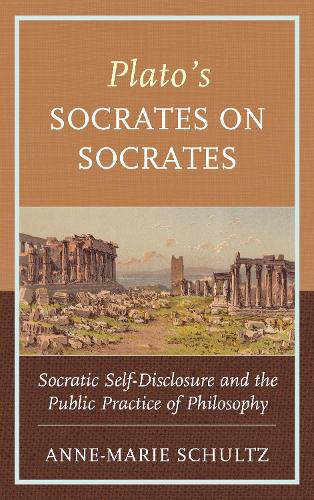
Plato's Socrates on Socrates: Socratic Self-Disclosure and the Public Practice of Philosophy
(Hardback)
Available Formats
Publishing Details
Plato's Socrates on Socrates: Socratic Self-Disclosure and the Public Practice of Philosophy
By (Author) Anne-Marie Schultz
Bloomsbury Publishing PLC
Lexington Books
19th March 2020
United States
Classifications
Professional and Scholarly
Non Fiction
Literary studies: ancient, classical and medieval
History of ideas
183.2
Physical Properties
Hardback
152
Width 160mm, Height 229mm, Spine 18mm
399g
Description
In Plato's Socrates on Socrates: Socratic Self-Disclosure and the Public Practice of Philosophy, Anne-Marie Schultz analyzes the philosophical and political implications of Platos presentation of Socrates self-disclosive speech in four dialogues: Theaetetus, Symposium, Apology, and Phaedo. Schultz argues that these moments of Socratic self-disclosure show that Platos presentation of Socrates the narrator is much more pervasive than the secondary literature typically acknowledges. Despite the pervasive appearance of a Socrates who describes his own experience throughout the dialogues, Socratic autobiographical self-disclosure has received surprisingly little scholarly attention. Platos use of narrative, particularly his trope of Socrates the narrator, is often subsumed into discussions of the dramatic nature of the dialogues more generally rather than studied in its own right. Schultz shows how these carefully crafted narrative remarks add to the richness and profundity of the Platonic texts on multiple levels. To illustrate how these embedded Socratic narratives contribute to the portrait of Socrates as a public philosopher in Platos dialogues, the author also examines Socratic self-disclosive practices in the works of bell hooks, Kathy Khang, and Ta-Neishi Coates, and even practices the art of Socratic self-disclosure herself.
Reviews
Schultz (Baylor) has written a compelling portrait of Socratic philosophizing that is very much a true believer's account. Retelling her own "way to philosophy," Schultz reflects on how Socrates's strategies of self-disclosure reveal important lessons for "the public practice of philosophy." After four chapter-long inquiries into Socratic self-disclosure in the Theaetetus, Symposium, Apology, and Phaedo, Schultz draws out the full, emotional complexity of the enigmatic Plato, who was largely given to hiding nothing and debating nearly every life-choice he faced in public. She concludes her reading with a synoptic reflection about the life of civic engagement as a public philosopher today, endorsing the echoes of Socratic philosophizing that she finds in the writings of bell hooks, Khang, and Coates. Drawing on her own experiences as a public philosopher--blogging, travelling to India, and leading social justice reading groups--Schultz crystallizes the contemporary relevance of Plato's Socrates. The text is well researched and documented, and mostly free of jargon. The clarity of Schulz's arguments and her lucid prose open the book to a large audience. Summing Up: Recommended. Lower-division undergraduates through faculty.
-- "Choice Reviews"Author Bio
Anne-Marie Schultz is professor of philosophy at Baylor University.
